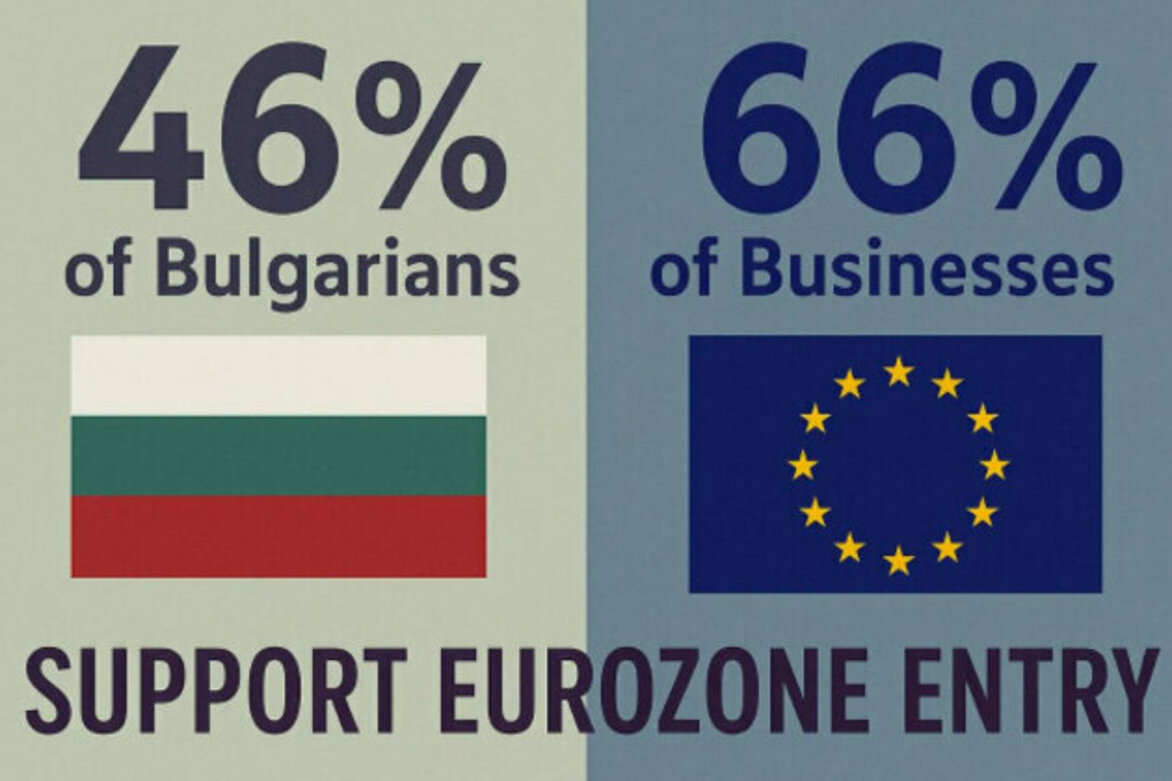Over 46% of Bulgarians and 66% of Businesses Support Eurozone Entry
Novinite.com
12 Jun 2025

Public and business attitudes toward Bulgaria's adoption of the euro were detailed at a briefing hosted by the Ministry of Finance, where sociologist Boryana Dimitrova of Alpha Research presented findings from two nationally representative surveys. The studies, conducted in April and May 2025, reveal a society that remains split on the issue - with a strong generational and professional divide - as the country moves closer to eurozone membership.
According to the latest data, 46.5% of Bulgarian citizens say they fully or mostly support the country's accession to the euro area, while 46.8% are mostly or entirely opposed. A further 6.7% say they are unable to judge. Support among businesses is significantly higher - 66.3% of companies approve of euro adoption, compared to 33.6% who oppose it, and only 0.1% who have no opinion.
The surveys also explored broader attitudes toward European integration. Just over 56% of citizens believe Bulgaria should continue deepening its ties with the EU. Among business respondents, this figure is even higher, at 64.3%.
Finance Minister Temenuzhka Petkova emphasized that Bulgaria has met all technical criteria for eurozone accession, as confirmed in convergence reports issued by the European Commission and the European Central Bank on June 4. She expressed confidence that the EU Council would approve Bulgaria's entry on July 8. ?We hope the accession process will go smoothly and dispel public concerns,? she told reporters.
The survey also examined perceptions of the euro's expected economic impact. In the short term, 35% of citizens believe the effects will be positive, while 55.9% anticipate negative consequences. A small segment - 9.1% - say they cannot assess the impact. Among businesses, 53.2% expect short-term benefits, while 39.4% foresee challenges and 7.4% are undecided.
Looking further ahead, public expectations improve. Nearly half of respondents - 48% - believe the euro will bring long-term benefits, while 39.1% think the opposite. The remaining 12.9% are unsure. Among business leaders, long-term optimism is more pronounced: 60.5% foresee positive effects, 35.1% predict negative outcomes, and 4.4% are undecided.
Dimitrova noted that short-term fears are largely driven by economic anxiety, fueled in part by misinformation and a general lack of knowledge. Some concerns, she said, intensified following a recent statement by the President, which amplified public hesitation.
When asked about specific benefits, 61.1% of citizens highlighted the ease of travel and payment across borders. Others mentioned the elimination of currency exchange losses (44.3%), improved trade with other EU nations (33.8%), and the fact that money in bank accounts will be automatically converted into euros (21.8%). However, only 19.3% appeared to be fully aware that bank conversions will be free of charge, pointing to what the sociologist described as a low level of public awareness on key aspects of the transition.
Businesses identified several anticipated advantages: reduced transaction costs (39.2%), increased foreign investment interest (38%), improved competitiveness (28.8%), easier collaboration with international partners (26.8%), and potentially lower interest rates on loans (also 26.8%).
Citizens also shared a range of negative expectations. Over 65% anticipate a rise in prices, while 59.4% fear a spike in inflation. More than half (55.9%) are concerned about the possibility of fraud or price manipulation, and 48% believe people will struggle to adapt to the new currency. Around 39.3% expressed fears of declining wages or pensions.
From a business perspective, concerns include rising costs of goods (42.8%), higher labor expenses (38%), more expensive raw materials (35.4%), and significant challenges for small enterprises - particularly microbusinesses - with 30.4% expressing doubts about their ability to adapt to the euro.
Demographic data paints a clearer picture of the divide. Younger and middle-aged individuals, including those living not only in Sofia but also in regional centers, and people employed in dynamic sectors, are the most supportive of euro adoption. Opposition is most common among the elderly, especially those living alone, people with disabilities, and middle-aged individuals with secondary education, many of whom are active social media users and exposed to online disinformation.
Microbusinesses, in particular, appear to be the most skeptical economic actors.
Other figures underscore the euro's presence in daily life. Over half - 51.2% - of Bulgarians say they used euros in the past year, while 67% of businesses report using the currency in transactions with partners and clients. When asked in which currency they would list property or vehicle sales, 51.6% of citizens answered ?in euros.?
Among those who traveled to EU countries, 69% said they believe people in the eurozone enjoy a better standard of living, a sentiment noted by Dimitrova.
Finance Minister Petkova reiterated that no lev will be lost in the transition. ?The BNB will convert every lev into euros at the official exchange rate with no time limit,? she said. To help citizens and businesses adapt, more than 100 informational events are planned across the country by the end of the year. The government has also signed memorandums with employers? and labor organizations to support a smooth legal and practical transition under the Law on the Adoption of the Euro.
The sociological studies were commissioned by the Ministry of Finance and carried out by Alpha Research between April 8?16 and May 22?28. The surveys included 1,200 citizens aged 16 and above, interviewed in their homes via tablet, and 500 business owners or senior managers responsible for company strategy.
Sources:Alpha Research and the Ministry of Finance
